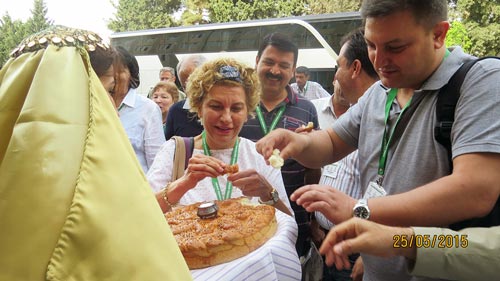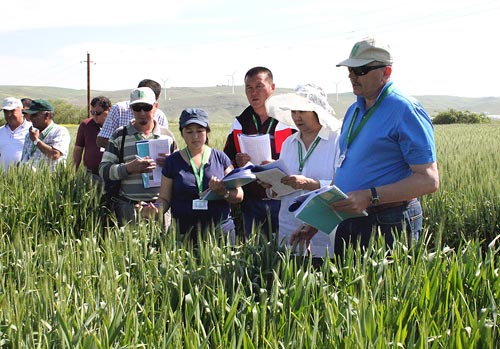The International Winter Wheat Improvement Program (IWWIP) held its 2015 International Winter Wheat Traveling Seminar in Azerbaijan and Georgia on 24 May. More than 40 participants from 18 countries attended the seminar, which covered more than 1,000 kilometers in four days.

Winter wheat is a major food crop in Central and West Asia, where it covers 14 million hectares. IWWIP, a cooperative program between CIMMYT, Turkey’s Food, Agriculture and Livestock Ministry and the International Center for Agricultural Research in the Dry Areas (ICARDA), develops germplasm for Central and West Asia and serves as a mechanism for global winter wheat germplasm and knowledge exchange.
Every two years, IWWIP conducts international traveling seminars to assess progress in the development, adoption and impact of new varieties and gather feedback from partners. Previous seminars have been conducted in Turkey, Ukraine, Uzbekistan, Bulgaria and Romania. This year’s seminar was funded by Turkey’s Food, Agriculture and Livestock Ministry and by FAO’s Central Asia Office, which also provided technical support and supported three participants.
IWWIP winter wheat varieties and spring wheat varieties from international centers occupy more than 70% of Azerbaijan’s total wheat area and contribute substantially to food security through their high yields and resistance to stripe rust, a disease prevalent in the region.
Participants gathered in Baku then went on to visit Azeri Research Institute of Farming, the Genetic Resources Institute, and Gobustan and Terter Experiment Stations. “Participants were very impressed by the experimental and breeding work at all sites visited,” said Alexey Morgounov, Head of IWWIP. “There is an established system of wheat germplasm screening, selection of superior germplasm, official testing and release, multiplication and promotion.”

In Georgia, the group participated in a field day at Lomtagora Farm, where new winter wheat varieties were identified and promoted. The group also visited the Georgian National Research Center experiment station and reviewed the crop research being conducted there. Lomtagora Farm hosted a summary meeting featuring several key presentations on food security, application of new genomic tools and fast multiplication and promotion of new varieties. Recommendations for future IWWIP activities discussed at the meeting included expanding and improving current breeding and germplasm exchange activities and focusing on training young wheat breeders in Turkey.
“An important outcome of the seminar was the establishment of personal connections between participants, as well as building formal ties,” said Morgounov. “The group was highly impressed by the new generation of young, intelligent and driven wheat breeders and researchers in Azerbaijan and Georgia, and we look forward to a successful seminar in 2017.”
 Capacity development
Capacity development